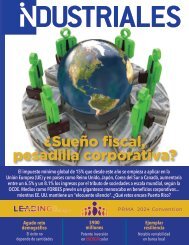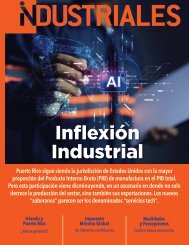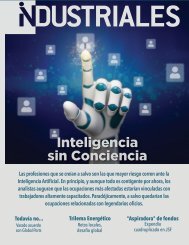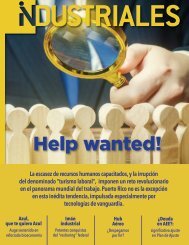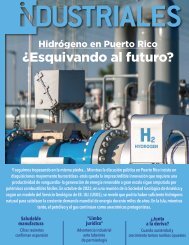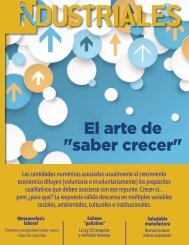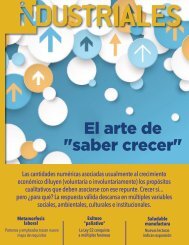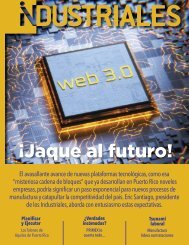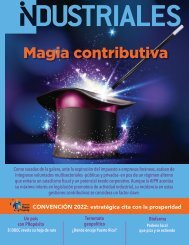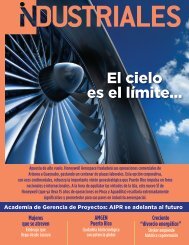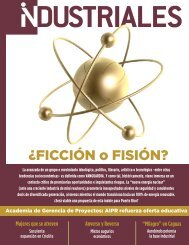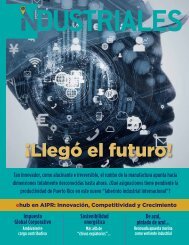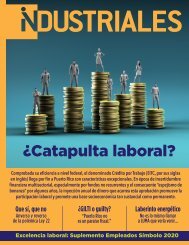INDUSTRIALES_NUM 5
Create successful ePaper yourself
Turn your PDF publications into a flip-book with our unique Google optimized e-Paper software.
By Javier Balmaceda * / INDUSTRIALES
POLÍTICA PÚBLICA / ECONOMÍA
l
l
l
falls far short of what is needed, and that is especially the case
for Puerto Rico. Like other jurisdictions, Puerto Rico is
incurring large
l New costs as it seeks to contain and treat the coronavirus
and accompanying spike in joblessness, and it’s confronting
gaping budget shortfalls as revenues decline sharply
due to the economic slowdown. More fiscal relief is needed
to help both states and Puerto Rico avoid deep spending
cuts and public-sector layoffs that would deepen and
prolong the recession.
l Extension of Families First’s school meal replacement
benefits. Though Puerto Rico operates the federally assisted
national school lunch and breakfast programs, the
Families First Act failed to include the Commonwealth
in an important provision — known as Pandemic-EBT
(or P-EBT) — that allows states to issue nutrition benefits
through electronic benefit transfer cards to families
with school-aged children who are missing out on free
and reduced-price school meals because their schools are
closed. As a result, close to 300,000 children enrolled in
Puerto Rico public schools (which provide universal free
meals) are missing out on the benefits available elsewhere
to replace the lost value of school meals. Poor children in
Puerto Rico could gain access to replacements for the lost
value of school meal assistance if the federal government
enabled the Commonwealth to offer P-EBT benefits.
Puerto Rico did receive roughly $295 million in supplemental
Nutrition Assistance Program (NAP) funding to
deal with the pandemic, but that amount is needed to cover
increased costs stemming from job losses (and hence
more people qualifying for aid) and falling incomes (and
hence many people qualifying for larger benefits). Without
access to P-EBT, Puerto Rico would need to choose
between funding school meal replacement benefits or providing
additional basic household assistance to workers
who have lost jobs or to seniors or others who are struggling
to afford food, a choice no state or territory participating
in SNAP need make. Puerto Rico’s governor, the
Financial Oversight and Management Board for Puerto
Rico, and charitable and other nonprofit organizations in
the Commonwealth have called on Congress to include
Puerto Rico in this important program.
l Further NAP increases. The $295 million for NAP that
Puerto Rico obtained in the coronavirus packages enacted
to date is substantially less than the additional SNAP benefits
being provided in the states. More funding is needed
in Puerto Rico to help families afford food and boost overall
consumer spending while the economy remains weak.
Policymakers should implement a new, temporary SNAP
benefit increase nationally and, at a minimum, provide the
same percentage increase for NAP funding as is being applied
to SNAP benefits. That’s especially true considering
that NAP funds will have to cover — within a capped
block grant — both the cost of increased participation due
to the economic slump and the costs of providing more
adequate benefit levels. (In SNAP, by contrast, the federal
government covers the cost of increased participation automatically.)
Ultimately, Puerto Rico will need further funding to adequately
provide food assistance, given NAP’s longstanding
inadequacies. The NAP block grant is insufficient to cover
the needs of the most vulnerable families in Puerto Rico
even in better economic times. Research indicates that
as many as one-third of Puerto Rico adults were already
struggling to afford adequate food before the pandemic.
Moreover, unlike SNAP, NAP doesn’t automatically expand
to meet increased need when the economy turns
down.
An EITC expansion and extension of the Child Tax
Credit to smaller families, as envisioned in the Economic
Mobility Act (H.R. 3300) approved by the House Ways
and Means Committee in 2019. As noted above, Puerto
Rico residents are not eligible for the federal EITC. This
House proposal would supplement Puerto Rico’s modest
local EITC with federal matching funds and make it more
substantial. It also would broaden the Child Tax Credit,
extending it to families in Puerto Rico with one or two
children, and making the credit available to children in
families with the lowest incomes both on the mainland
and in Puerto Rico. These changes would make the credits
a strong tool to assist low- and moderate-wage working
families and their children as the pandemic’s economic
effects linger. The changes also would help reduce the
Commonwealth’s high poverty and low labor-force participation
rates.
An emergency cash assistance fund. During the Great
Recession, the federal government established a TANF
Emergency Fund that provided funds to states to help
destitute families avert crises and then go back to work. A
new fund of this nature could provide much-needed funds
both to states and to areas like Puerto Rico to avert homelessness
and other crises now and to establish subsidized
job programs after the health crisis diminishes.
72 iNDUSTRIALES - Revista Líder de Negocios e Innovación Industrial



